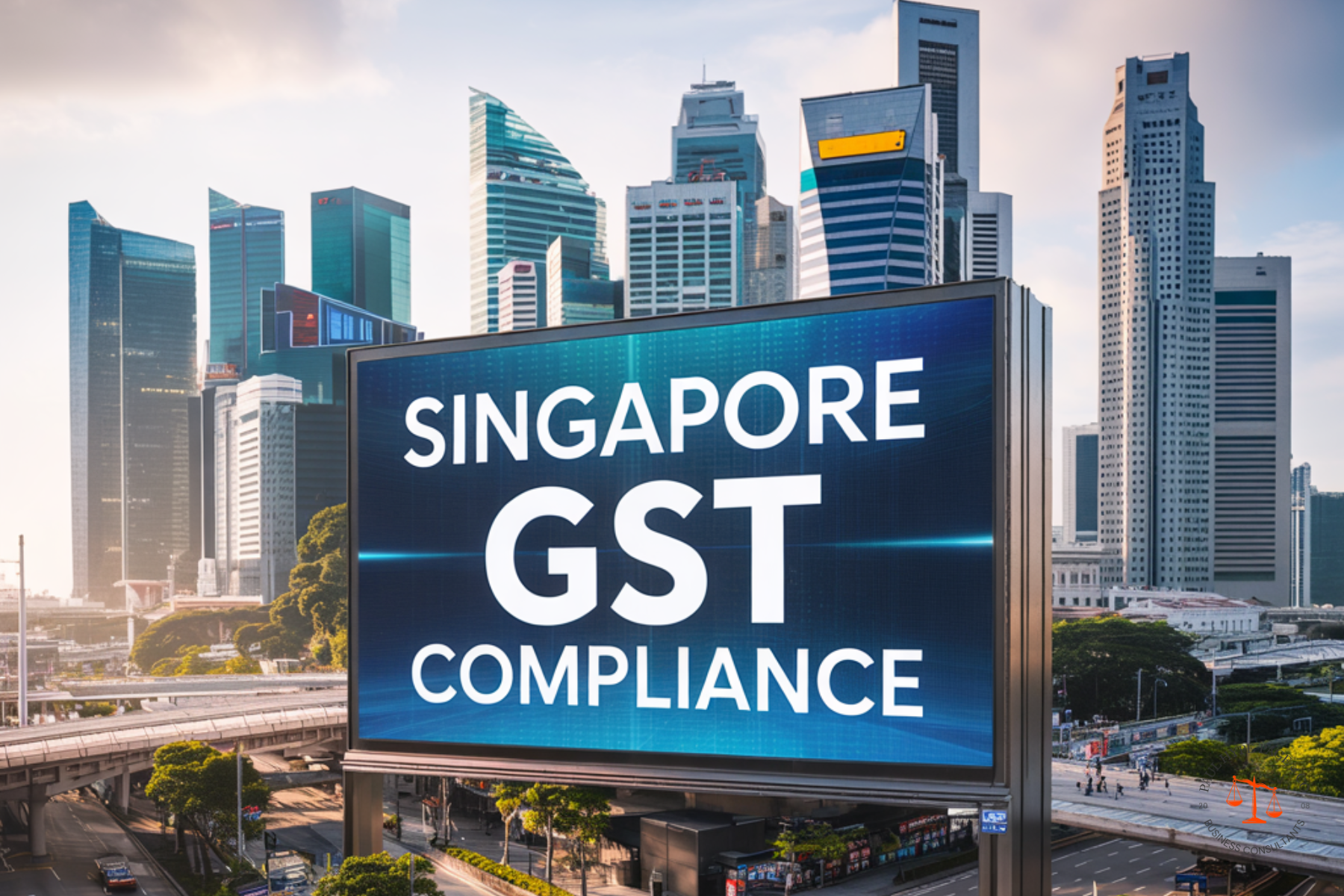Outline
- Why Newly Registered GST Companies Must Prepare for InvoiceNow (2025 Update)
- What Is InvoiceNow and Why It Matters for GST-Registered Companies
- What Are the Mandatory GST Requirements for Newly Registered Companies?
- How to Register for InvoiceNow as a Newly GST-Registered Company
- Why InvoiceNow Is a Game-Changer for GST Compliance
- Common Mistakes New GST Registrants Make (and How to Avoid Them)
- What Happens If You Fail to Comply with GST or InvoiceNow Requirements?
- How Professional Accounting Firms Help New GST Companies Stay Compliant
- Why Paul Hype Page & Co. Is Your Trusted Partner for GST Compliance
- FAQs

Why Newly Registered GST Companies Must Prepare for InvoiceNow (2025 Update)
Singapore’s Goods and Services Tax (GST) system is entering a new digital phase. Starting November 2025, all newly registered GST companies will be required by the Inland Revenue Authority of Singapore (IRAS) to adopt InvoiceNow, Singapore’s nationwide e-invoicing network. This move is part of the government’s digitalization strategy to enhance efficiency, improve tax accuracy, and support seamless B2B transactions. For businesses registering for GST—whether compulsory or voluntary—InvoiceNow is no longer optional. It will be a core compliance step under Singapore’s GST framework.
Understanding what’s required from day one can save you from costly mistakes, compliance penalties, and filing errors. This guide explains all the must-have GST requirements for new registrants and how to prepare your systems for InvoiceNow adoption before the 2025 deadline.
What Is InvoiceNow and Why It Matters for GST-Registered Companies
InvoiceNow is Singapore’s official e-invoicing network that allows businesses to send and receive invoices directly between their accounting systems, instead of relying on PDFs or email attachments.
It operates on the Peppol framework, an internationally recognized e-invoicing standard used in over 40 countries. The key goal is to create a secure, automated, and paperless invoicing ecosystem across Singapore’s business community.
Key Benefits of InvoiceNow for GST Companies
- Faster invoice processing: Invoices go directly to your customer’s system for approval and payment.
- Better accuracy: Reduces manual entry errors that often cause GST filing discrepancies.
- Real-time validation: Ensures invoice details meet IRAS and Peppol standards before submission.
- Improved cash flow: Minimizes disputes and payment delays through structured data exchange.
- Enhanced audit trail: Creates a secure, digital record for all taxable transactions.
With InvoiceNow becoming mandatory for all new GST-registered businesses, understanding and implementing it early ensures smooth compliance from your first invoice onwards.
What Are the Mandatory GST Requirements for Newly Registered Companies?
When your company receives GST approval, several obligations come into effect immediately. IRAS expects new registrants to comply with both invoicing and reporting standards. Here’s what you must do:
1. Register for InvoiceNow Immediately After GST Approval
From November 2025, newly registered GST companies must onboard the InvoiceNow network before issuing their first invoice.
You can do this by:
- Signing up with a Peppol Access Point provider approved by IMDA and IRAS, or
- Using an accounting software that is already InvoiceNow-ready (such as Xero, QuickBooks, MYOB, or similar).
Once connected, your business will be listed in the Peppol Directory, confirming your readiness to exchange e-invoices with other companies in Singapore and overseas.
2. Issue Compliant Tax Invoices for All GST-Registered Transactions
A valid tax invoice is the foundation of GST compliance. Every invoice you issue must contain specific details as required by IRAS, including:
- Your business name and GST registration number
- Invoice date and unique serial number
- Customer’s name and address
- Description of goods or services supplied
- Total amount payable (excluding and including GST)
- The applicable GST rate (currently 9%)
- A clear statement such as “Price includes GST” or “GST is charged at 9%”
Failing to issue proper tax invoices can result in your customers being unable to claim input tax—and may lead to IRAS penalties for non-compliance.
3. File Accurate GST Returns Every Quarter
GST-registered companies must file their GST F5 return on a quarterly basis, even if there were no sales or purchases during the period.
Your GST F5 should declare:
- Total taxable sales and output tax collected
- Total taxable purchases and input tax claimed
- Net GST payable or refundable to IRAS
All filings must be made electronically through myTax Portal. InvoiceNow integration simplifies this by ensuring accurate data flows between your invoicing system and IRAS.
Late or incorrect submissions can result in fines or additional scrutiny from tax authorities.
4. Maintain Proper Accounting and GST Records
Under the Goods and Services Tax Act, all registered businesses must retain accounting and GST records for at least five years from the end of the relevant accounting period.
Documents to keep include:
- Tax invoices and receipts
- Credit and debit notes
- Purchase orders and payment vouchers
- Import and export permits
- Accounting ledgers and bank statements
- Any supporting documents for input tax claims
These records must be easily retrievable for IRAS audits. Businesses using digital invoicing systems will automatically have a secure audit trail, reducing administrative workload.
5. Display GST Registration Information Clearly
To promote transparency, IRAS requires all GST-registered businesses to:
- Display their GST registration number on invoices, websites, and official documents.
- Indicate whether prices displayed are inclusive or exclusive of GST.
This prevents customer confusion and ensures pricing is aligned with IRAS’ Fair Trading Guidelines.
6. Charge and Account for GST Correctly
Ensure that you apply the correct GST rate and treatment for different types of supplies:
- Standard-rated supplies (9%) – Most local goods and services.
- Zero-rated supplies (0%) – Exported goods and international services.
- Exempt supplies – Financial services, residential property, and investment precious metals.
Misclassifying supplies is one of the most common errors detected in GST audits. Always confirm your GST treatment before issuing invoices or filing returns.
How to Register for InvoiceNow as a Newly GST-Registered Company
Onboarding InvoiceNow is a simple four-step process:
Step 1: Choose an IMDA-Approved Solution Provider
Select an accounting or billing software that supports Peppol e-invoicing. IMDA maintains an updated list of certified providers on its website.
Step 2: Connect Your Business to the Peppol Network
Your provider will handle the technical setup and register your company on the Peppol Directory. Once listed, other companies can exchange e-invoices with you instantly.
Step 3: Test and Validate Your System
Before sending live invoices, perform a test run to ensure your InvoiceNow connection works properly and that invoice data flows correctly.
Step 4: Start Issuing and Receiving E-Invoices
Once live, your business can send, receive, and archive invoices digitally in real-time — meeting both IRAS and IMDA requirements.
Why InvoiceNow Is a Game-Changer for GST Compliance
1. Ensures Real-Time Data Accuracy
Manual invoicing errors are one of the main reasons for GST discrepancies. InvoiceNow’s standardized data format ensures your sales and purchase data is always accurate and up to date.
2. Reduces Risk of Fraud or Duplicate Invoices
Each InvoiceNow record is uniquely traceable, minimizing the risk of tampering or duplication—common triggers for IRAS audits.
3. Simplifies GST Return Filing
When your invoices are digitally linked, total taxable values can be automatically computed, reducing the time needed for preparing quarterly returns.
4. Strengthens Business Reputation
Being InvoiceNow-ready signals to customers and suppliers that your business operates with transparency, speed, and professionalism—an advantage in B2B partnerships and tender applications.
Common Mistakes New GST Registrants Make (and How to Avoid Them)
- Delaying InvoiceNow Onboarding: Waiting until after GST registration to set up e-invoicing may cause filing delays or compliance issues. Start the process early.
- Using Non-Compliant Invoice Templates: Traditional PDF invoices or Excel sheets will not meet Peppol or IRAS validation standards after November 2025.
- Ignoring GST Rate Changes: Ensure your accounting system reflects the current 9% GST rate and applies it correctly to each taxable supply.
- Missing Filing Deadlines: Each GST return is due one month after the end of your accounting period. Late filings can result in fines of up to $10,000 and 5% of unpaid tax.
- Incorrect Input Tax Claims: Only claim GST on valid business expenses supported by proper tax invoices. Personal or non-business expenses cannot be claimed.
What Happens If You Fail to Comply with GST or InvoiceNow Requirements?
Non-compliance can attract significant financial and legal consequences, including:
- Penalties for Late Filing or Payment: 5% penalty on unpaid tax and 2% additional penalty for every subsequent month.
- Invalid Input Tax Claims: IRAS may disallow claims not supported by valid invoices.
- Suspension of GST Registration: Persistent non-compliance can lead to deregistration or investigation.
- Audit and Enforcement Actions: IRAS may conduct audits or request additional records, causing business disruption.
Setting up your systems correctly from the start ensures you remain compliant and avoids unnecessary administrative burdens.
How Professional Accounting Firms Help New GST Companies Stay Compliant
For new business owners, navigating GST and e-invoicing rules can be overwhelming. Partnering with a professional accounting firm ensures you:
- Get expert guidance on GST registration, invoice setup, and quarterly reporting.
- Receive support in implementing InvoiceNow systems correctly.
- Maintain accurate and IRAS-ready records for every transaction.
- Stay ahead of changing tax requirements and rate adjustments.
Professional Corporate Service Providers (CSPs) ensure your company not only complies with IRAS standards but also benefits from efficient workflows and reduced compliance risk.
Why Paul Hype Page & Co. Is Your Trusted Partner for GST Compliance
With over 15 years of experience in Singapore corporate taxation, accounting, and company incorporation, Paul Hype Page & Co. (PHP) is a trusted partner for startups and SMEs across Asia. We specialize in helping newly registered businesses manage their GST obligations, including:
- GST registration and advisory
- Accounting and bookkeeping in accordance with IRAS standards
- Preparation and filing of quarterly GST returns
- Digital compliance setup, including InvoiceNow onboarding through approved providers
- Audit readiness and record management
Our team ensures that every client’s GST process is accurate, compliant, and future-ready — so you can focus on growing your business, not paperwork.
FAQs
Failure to comply may result in fines, delayed refund claims, or suspension of GST registration by IRAS.
You can use any IMDA-certified accounting software that supports the Peppol e-invoicing standard, such as Xero, QuickBooks, or MYOB.
Yes. IRAS encourages existing GST-registered companies to onboard InvoiceNow early to enjoy faster processing and smoother compliance.
Yes. Whether registration is compulsory or voluntary, all new GST registrants must comply with InvoiceNow from November 2025 onward.
Starting November 2025, all newly registered GST businesses must register for and use InvoiceNow upon receiving GST approval.
Share This Story, Choose Your Platform!
Related Business Articles







